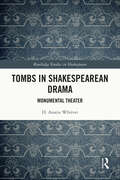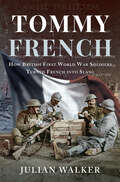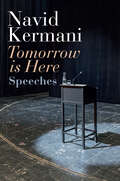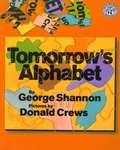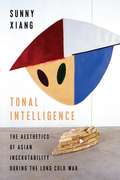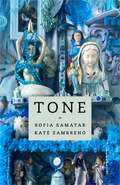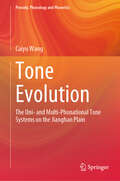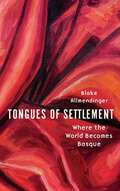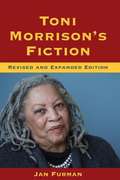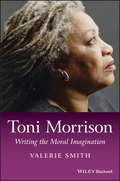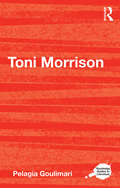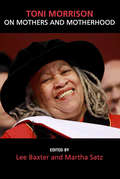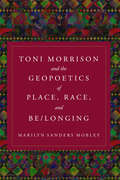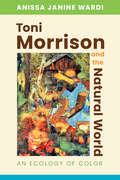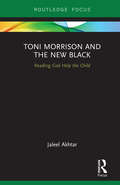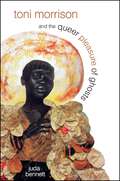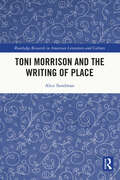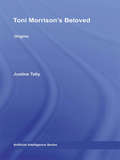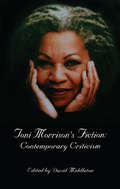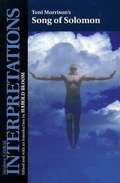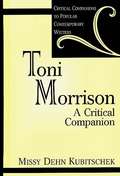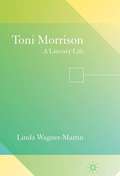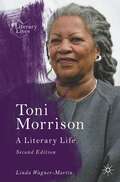- Table View
- List View
Tombs in Shakespearean Drama: Monumental Theater (Routledge Studies in Shakespeare)
by H. Austin WhitverTombs in Shakespearean Drama explores the rhetorical deployment of tombs and monuments on the early modern stage, demonstrating their historiographic power and mythmaking potential. By analyzing references to tombs in plays by Shakespeare and others in conjunction with extant monuments, this volume demonstrates how these references function in two overlapping ways in period drama: monuments act as repositories of information about the past, and they allow the living to construct and preserve fictive narratives. The stage exposes the flimsy materiality of paper, placing less value on the written word than period poetry. In this way, critics have perhaps oversold as universal Shakespeare’s poetic praise of stone. Tombs within plays act as a powerful historical and narrative medium, raising the stakes to provide the stage with the illusion of permanency. Playwrights use tombs to anchor the stage action, giving a sense of lasting importance to dramatic events and combatting the ephemeral nature of the playhouse. In drama, Shakespeare and others drew on the persona preserved on tombs; this volume widens our view of how these representations interacted in the commemorative economy of early modern England. Within the playhouse, it was the tomb, not the tome, that stood as a symbol of permanence.
Tommy French: How British First World War Soldiers Turned French into Slang
by Julian Walker‘Napoo’, ‘compray’, ‘san fairy ann’, ‘toot sweet’ are anglicized French phrases that came into use on the Western Front during the First World War as British troops struggled to communicate in French. Over four years of war they created an extraordinary slang which reflects the period and brings the conflict to mind whenever it is heard today. Julian Walker, in this original and meticulously researched book, explores the subject in fascinating detail. In the process he gives us an insight into the British soldiers’ experience in France during the war and the special language they invented in order to cope with their situation. He shows how French place-names were anglicized as were words for food and drink, and he looks at what these slang terms tell us about the soldiers’ perception of France, their relationship with the French and their ideas of home. He traces the spread of ‘Tommy French’ back to the Home Front, where it was popularized in songs and on postcards, and looks at the French reaction to the anglicization of their language.
Tommy French: How British First World War Soldiers Turned French into Slang
by Julian Walker‘Napoo’, ‘compray’, ‘san fairy ann’, ‘toot sweet’ are anglicized French phrases that came into use on the Western Front during the First World War as British troops struggled to communicate in French. Over four years of war they created an extraordinary slang which reflects the period and brings the conflict to mind whenever it is heard today. Julian Walker, in this original and meticulously researched book, explores the subject in fascinating detail. In the process he gives us an insight into the British soldiers’ experience in France during the war and the special language they invented in order to cope with their situation. He shows how French place-names were anglicized as were words for food and drink, and he looks at what these slang terms tell us about the soldiers’ perception of France, their relationship with the French and their ideas of home. He traces the spread of ‘Tommy French’ back to the Home Front, where it was popularized in songs and on postcards, and looks at the French reaction to the anglicization of their language.
Tomorrow is Here: Speeches
by Navid KermaniNavid Kermani is not only one of Germany&’s most distinguished writers and public intellectuals, he is also an outstanding public speaker who mesmerizes audiences with his well-crafted sentences and turns of phrase. Whether he is speaking about the plight of refugees or delivering a eulogy at his father&’s graveside, Kermani finds words that surprise his listeners, enlighten them, provoke them, disturb them or move them to tears. As a German of Iranian descent whose parents settled in Germany, Kermani is particularly sensitive to the issues raised by migration and the perceived tensions between Islam and the West. His speeches are a powerful demonstration of how much we stand to gain by adhering to the values of openness, tolerance and mutual respect for the beliefs and practices of those from other cultures who live among us.
Tomorrow's Alphabet
by George Shannon"B is for eggs... D is for puppies...Z is for countdown..." A delightful new twist for learning the ABCs.
Tonal Intelligence: The Aesthetics of Asian Inscrutability During the Long Cold War (Literature Now)
by Sunny XiangWhy were U.S. intelligence organizations so preoccupied with demystifying East and Southeast Asia during the mid-twentieth century? Sunny Xiang offers a new way of understanding the American cold war in Asia by tracing aesthetic manifestations of “Oriental inscrutability” across a wide range of texts. She examines how cold war regimes of suspicious thinking produced an ambiguity between “Oriental” enemies and Asian allies, contributing to the conflict’s status as both a “real war” and a “long peace.”Xiang puts interrogation reports, policy memos, and field notes into conversation with novels, poems, documentaries, and mixed media work by artists such as Theresa Hak Kyung Cha, Kazuo Ishiguro, Ha Jin, and Trinh T. Minh-ha. She engages her archive through a reading practice centered on tone, juxtaposing Asian diasporans who appear similar in profile yet who differ in tone. Tonal Intelligence considers how the meaning of race, war, and empire came under pressure during two interlinked periods of geopolitical transition: American “nation-building” in East and Southeast Asia during the mid-twentieth century and Asian economic modernization during the late twentieth century. By reading both state records and aesthetic texts from these periods for their tone rather than their content, Xiang shows how bygone threats of Asian communism and emergent regimes of Asian capitalism have elicited distinct yet related anxieties about racial intelligibility. Featuring bold methods, unlikely archives, and acute close readings, Tonal Intelligence rethinks the marking and making of race during the long cold war.
Tone
by Kate Zambreno Sofia SamatarTone is a collaborative study of literary tone, a notoriously challenging and slippery topic for criticism. Both granular and global, infusing a text with feeling, tone is so difficult to pin down that responses to it often take the vague form of “I know it when I see it.”In Tone, a cooperative authorial voice under the name of the Committee to Investigate Atmosphere begins from the premise that tone is relational, belonging to shared experience rather than a single author, and should be approached through a communal practice. In partnership, the Committee explores the atmospheres emanating from texts by Nella Larsen, W. G. Sebald, Heike Geissler, Hiroko Oyamada, Mieko Kanai, Bhanu Kapil, Franz Kafka, Renee Gladman, and others, attending to the chafing of political irritation, the hunger of precarious and temporary work, and the lonely delights of urban and suburban walks.This study treats a variety of questions: How is tone filtered through translation? Can a text hold the feelings that pass between humans and animals? What can attention to literary tone reveal about shared spaces such as factories, universities, and streets and the clashes and connections that happen there? Searching and conversational, Tone seeks immersion in literary affect to convey the experience of reading—and living—together.
Tone Evolution: The Uni- and Multi-Phonational Tone Systems on the Jianghan Plain (Prosody, Phonology and Phonetics)
by Caiyu WangThis book provides a start of defining the uni- and multi-phonational tone systems of geographically-connected dialects under a phonation-pitch tonal model. It also demonstrates an interpretation of the contemporary ongoing tonal variations and varieties from the perspective of language evolution. Acoustic data are collected from five adjacent counties on the Jianghan Plain in China, where two varieties of Southwestern Mandarin and one variety of Gan Dialect are spoken. Falsetto and breathy phonations are applied in this area for phonological distinction, and thus the modal-only dialects co-occur with the di-phonational (falsetto and modal) and tri-phonational (falsetto, modal, and breathy) ones. The acoustic and perceptual analyses are conducted to define tones under the Multi-Register Four-Level Tonal Model, a frame considering both pitch and phonation for the definition of tones. The synchronic variations and varieties within and across speakers/dialects are interpreted in the dynamic interplay of tones mainly governed by phonetic and phonological reasons. The inner-system tonal differences of individual dialectal varieties together with the general distributive patterns of tones in this area are evaluated to determine the paths of tone evolution.Fresh for it exploring the definition and linguistic meaning of the dynamic modal- and non-modal tones, the book benefits researchers with data, research methods, and insight and helps the language teachers and learners understand and learn tones with what the lexical tones really are. The book is also written for the readers curious of tones and tone languages.
Tongues of Settlement: Where the World Becomes Basque
by Blake AllmendingerKnown for their cultural traditions, celebrated cuisine, and distinct language, Basque peoples originated in a small area in the Pyrenees Mountains called Euskal Herria, or the Basque Country. Over the centuries, large numbers of Basques have left their homeland to settle throughout Spain, France, North America, Latin America, and South Africa, accompanied by their unique language and literature.Tongues of Settlement traces how Basque emigrants and their descendants have adapted to the Americas by interacting with the land and people, while inscribing their presence and producing a body of literature distinct from the literature of Euskal Herria. Blake Allmendinger explores the evolving relationship between language and place, analyzing forms of remembrance used to signify the Basque presence in numerous countries, especially in the western United States, where most immigrants settled and where their descendants currently reside.Tongues of Settlement considers what eventually happens as assimilated Basques relinquish their native language yet maintain a connection to place. It includes works by Basque authors, translated into English, recounting their experiences in the American West; books by Basque American writers whose narratives are set (at least in part) in the Basque Country; popular genres published by Basque American authors; and recurrent themes in Basque American literature. In this first comprehensive study, Allmendinger traces the evolution of Basque American literature from its origins in medieval oral culture to the creation of a literary renaissance in the twenty-first century American West.
Toni Morrison
by Linda Wagner-MartinIn this revised introduction to Nobel Laureate Toni Morrison's novels, Jan Furman extends and updates her critical commentary. New chapters on four novels following the publication of Jazz in 1992 continue Furman's explorations of Morrison's themes and narrative strategies. In all Furman surveys ten works that include the trilogy novels, a short story, and a book of criticism to identify Morrison's recurrent concern with the destructive tensions that define human experience: the clash of gender and authority, the individual and community, race and national identity, culture and authenticity, and the self and other. As Furman demonstrates, Morrison more often than not renders meaning for characters and readers through an unflinching inquiry, if not resolution, of these enduring conflicts. She is not interested in tidy solutions. Enlightened self-love, knowledge, and struggle, even without the promise of salvation, are the moral measure of Morrison's characters, fiction, and literary imagination. Tracing Morrison's developing art and her career as a public intellectual, Furman examines the novels in order of publication. She also decodes their collective narrative chronology, which begins in the late seventeenth century and ends in the late twentieth century, as Morrison delineates three hundred years of African American experience. In Furman's view Morrison tells new and difficult stories of old, familiar histories such as the making of Colonial America and the racing of American society. In the final chapters Furman pays particular attention to form, noting Morrison's continuing practice of the kind of "deep" novelistic structure that transcends plot and imparts much of a novel's meaning. Furman demonstrates, through her helpful analyses, how engaging such innovations can be.
Toni Morrison
by Valerie SmithThis compelling study explores the inextricable links between the Nobel laureateOCOs aesthetic practice and her political vision, through an analysis of the key texts as well as her lesser-studied works, books for children, and most recent novels. Offers provocative new insights and a refreshingly original contribution to the scholarship of one of the most important contemporary American writersAnalyzes the celebrated fiction of Morrison in relation to her critical writing about the process of reading and writing literature, the relationship between readers and writers, and the cultural contributions of African-American literatureFeatures extended analyses of MorrisonOCOs lesser-known works, most recent novels, and books for children as well as the key texts"
Toni Morrison (Routledge Guides to Literature)
by Pelagia GoulimariToni Morrison's visionary explorations of freedom and identity, self and community, against the backdrop of African American history have established her as one of the foremost novelists of her time; an artist whose seriousness of purpose and imaginative power have earned her both widespread critical acclaim and great popular success. This guide to Morrison’s work offers: an accessible introduction to Morrison’s life and historical contexts a guide to her key works and the themes and concerns that run through them an overview of critical texts and perspectives on each of Morrison’s works cross-references between sections of the guide, in order to suggest links between texts, contexts and criticism a chronology of Morrison’s life and works. Part of the Routledge Guides to Literature series, this volume is essential reading for all those beginning detailed study of Toni Morrison and seeking a guide to her work and a way into the wealth of contextual and critical material that surrounds it.
Toni Morrison ON Mothers and Motherhood
by Lee BaxterThis collection of essays explores the gamut of Toni Morrison’s novels from her earliest to her most recent. Each of the essays examines the various ways in which Morrison’s work delineates and interrogates Western culture’s ideological norms of mothers, motherhood, and mothering. The essays consider Morrison’s female, and in some cases male, characters as challenging the concept that mothering and motherhood is a stable notion. The essays reveal both that mothering is a central concept in Morrison’s work and that an examination of this pervasive notion illuminates her corpus as a whole. Toni Morrison on Mothers and Motherhood offers a wide range of scholarship that provides a compelling look at Morrison’s work through an array of interdisciplinary approaches that are grounded in feminist/gender studies. This interdisciplinary collection of essays will be of interest to scholars and critics concerned with the notions of how we define mother/motherhood/mothering and the problem of its interpretation within Western society, as well as those engaged in the interpretation of African-American literature, and Morrison’s work in particular.
Toni Morrison and the Geopoetics of Place, Race, and Be/longing
by Marilyn Sanders MobleyToni Morrison’s readers and critics typically focus more on the “what” than the “how” of her writing. In Toni Morrison and the Geopoetics of Place, Race, and Be/longing, Marilyn Sanders Mobley analyzes Morrison’s expressed narrative intention of providing “spaces for the reader” to help us understand the narrative strategies in her work. Mobley’s approach is as interdisciplinary, intersectional, nuanced, and complex as Morrison’s. She combines textual analysis with a study of Morrison’s cultural politics and narrative poetics and describes how Morrison engages with both history and the present political moment. Informed by research in geocriticism, spatial literary studies, African American literary studies, and Black feminist studies at the intersection of poetics and cultural politics, Mobley identifies four narrative strategies that illuminate how Morrison creates such spaces in her fiction; what these spaces say about her understanding of place, race, and belonging; and how they constitute a way to read and re-read her work.
Toni Morrison and the Natural World: An Ecology of Color
by Anissa Janine WardiCritics have routinely excluded African American literature from ecocritical inquiry despite the fact that the literary tradition has, from its inception, proved to be steeped in environmental concerns that address elements of the natural world and relate nature to the transatlantic slave trade, plantation labor, and nationhood. Toni Morrison’s work is no exception. Toni Morrison and the Natural World: An Ecology of Color is the first full-length ecocritical investigation of the Nobel Laureate’s novels and brings to the fore an unequaled engagement between race and nature.Morrison’s ecological consciousness holds that human geographies are enmeshed with nonhuman nature. It follows, then, that ecology, the branch of biology that studies how people relate to each other and their environment, is an apt framework for this book. The interrelationships and interactions between individuals and community, and between organisms and the biosphere, are central to this analysis. They highlight that the human and nonhuman are part of a larger ecosystem of interfacings and transformations. Toni Morrison and the Natural World is organized by color, examining soil (brown) in The Bluest Eye and Paradise; plant life (green) in Song of Solomon, Beloved, and Home; bodies of water (blue) in Tar Baby and Love; and fire (orange) in Sula and God Help the Child. By providing a racially inflected reading of nature, Toni Morrison and the Natural World makes an important contribution to the field of environmental studies and provides a landmark for Morrison scholarship.
Toni Morrison and the New Black: Reading God Help the Child
by Jaleel AkhtarToni Morrison and the New Black examines how Morrison explores the concept of the new black in the context of post-soul, post-black and post-racial discourses. Morrison evolves the new black as symbolic of unprecedented black success in all walks of life, from politics to the media, business and beyond.The author's work shows how the new black reaffirms the possibility of upward mobility and success, and stands as testimony to the American Dream that anyone can achieve material success provided they work hard enough for it.
Toni Morrison and the Queer Pleasure of Ghosts
by Juda BennettToni Morrison and the Queer Pleasure of Ghosts radically intervenes in one of the most established and sacred topics in Toni Morrison scholarship, love. Moving beyond Morrison's representation of ghosts as the forgotten or occluded past, Juda Bennett uncovers how Morrison imagines the spectral sphere as always already queer, a provocation and challenge to heteronormativity—with the ghost appearing as an active participant in disruptions of compulsory heterosexuality, as a figure embodying closet desires, or as a disembodied emanation that counterpoints homophobia. From The Bluest Eye to Home, Morrison's novels have included many queer ghosts that challenge our most cherished conceptions of love and speak to cultural anxieties about black sexualities, gay marriage, AIDS, lesbian visibility, and transgender identities. Not surprisingly, the scene-stealing ghost Beloved appears at the very heart of this book, but Bennett cautions against interpretative stasis, inviting readers to break free of the stranglehold Beloved has had on imaginations, so as not to miss the full force of Morrison's lifelong project to queer love.
Toni Morrison and the Writing of Place (Routledge Research in American Literature and Culture)
by Alice SundmanHow does Toni Morrison create and form her literary places? As one of the first studies exploring Morrison’s archived drafts, notes, and manuscripts together with her published novels, this book offers fresh insights into her creative processes. It analyses the author’s textual choices, her writerly strategies, and her process of writing, all combining in shaping her literary places. In a methodology combining close reading and genetic criticism, the book examines Morrison’s writing—her drafting and crafting—of her fictional places. Focusing primarily on the novels Beloved (1987), Paradise (1997), and A Mercy (2008), it analyses particular instances of written places, illuminating the manifold ways in which they are formed as text, and showing the centrality of the ideas of joining in Beloved, transformation in Paradise, and articulation in A Mercy. Toni Morrison is a major literary figure in contemporary literature, and commonly considered one of the most influential American writers of the post-1960s era. Investigating the conjunction of her texts and manuscripts, this book continues, extends, and supplements the rich body of Morrison scholarship by illuminating how the genesis and formation of her multifaceted literary places constitute vital parts of her fictional writing.
Toni Morrison's 'Beloved': Origins (Routledge Transnational Perspectives on American Literature)
by Justine TallyThis work expands the scope of Morrison’s project to examine the ways and means of memory in the preservation of belief systems passed down from the earliest civilizations (both the Classical Greek and the Ancient Egyptian) as a challenge to the sterility of modernity. Moreover, this research explores the author’s specific use of Foucauldian theory as a vehicle for her narrative, which reclaims the very origins of civilization’s primal concerns with life, procreation and regeneration, springing from the very Heart of Africa. Despite the weight of "white" authority and the disparaging of "blackness," Beloved’s multiple "ghosts" conjure up a legacy so potent that no authoritarian discourse has been able to entirely erase it, a legacy that still speaks to us from a heritage we no longer acknowledge yet that nevertheless remains, and sustains us.
Toni Morrison's Fiction: Contemporary Criticism (Critical Studies in Black Life and Culture #30)
by David L. MiddletonFirst published in 1997. Routledge is an imprint of Taylor & Francis, an informa company.
Toni Morrison's Song of Solomon (Modern Critical Interpretations)
by Harold BloomAnalyses and essays about Morrison's Song of Solomon.
Toni Morrison: A Critical Companion
by Missy Dehn Kubitschek Kathleen Gregory KleinA part of critical companion series, this books looks at the work of contemporary author, Tony Morrison. Divided into several chapters, the work covers all of Tony Morrison's works--from "the Bluest Eye" to "Paradise."
Toni Morrison: A Literary Life (Literary Lives #67)
by L. Wagner-MartinA reading of the oeuvre of Toni Morrison — fiction, non-fiction, and other — drawing extensively from her many interviews as well as her primary texts. The author aligns Morrison's novels with the works of Virginia Woolf and William Faulkner, assessing her works as among the most innovative, and most significant, worldwide, of the past fifty years.
Toni Morrison: A Literary Life (Literary Lives)
by Linda Wagner-MartinA reading of the oeuvre of Toni Morrison—fiction, non-fiction, and other—drawing extensively from her many interviews as well as her primary texts, Toni Morrison: A Literary Life, second edition provides an overview of Morrison’s intellectual growth as an artist. Linda Wagner-Martin aligns Morrison's novels with the works of Virginia Woolf and William Faulkner, assessing her works as among the most innovative, and most significant, worldwide, of the past fifty plus years. The revised edition includes new discussion of God Help the Child, The Origin of Others, and The Source of Self-Regard. These additions present and intensify scholarship on Morrison’s major literary contributions, but also trace her significant role as a public intellectual, bringing to light the consistency of Morrison’s aesthetic and political visions.
Toni Morrison: Great American Writer
by Lisa Renee RhodesBiography of the famous writer who won a Nobel Prize for Literature.
